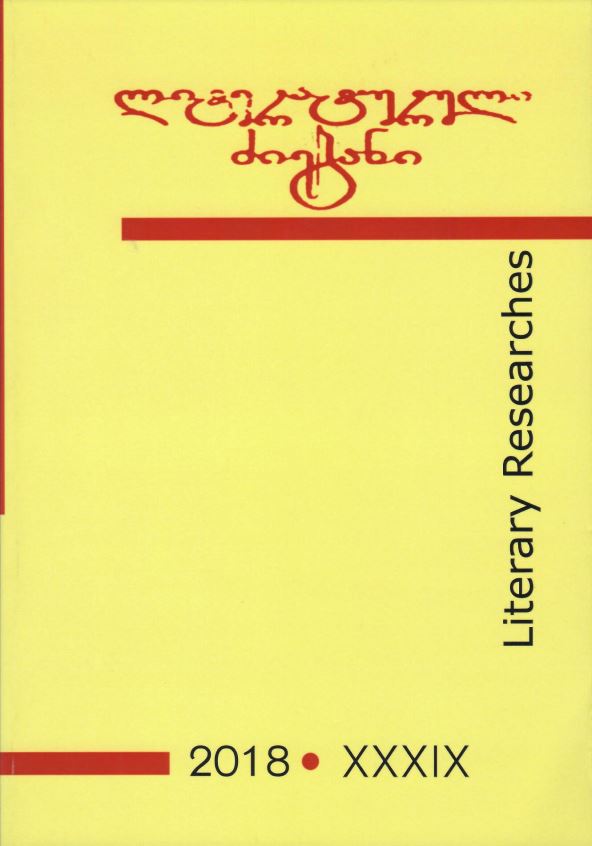გამოქვეყნებული 2018-12-20
საკვანძო სიტყვები
- Vazha-Pshavela,
- Aluda Ketelauri,
- Pangs of Conscience,
- Feeling of Guilt,
- Sacrifice
როგორ უნდა ციტირება
ანოტაცია
The inner metamorphosis experienced by a titular protagonist of “Aluda Ketelauri”, its significance cannot be more or less fully understood unless the motives for Aluda’s behavior at the last stage of the confrontation with his commune are clarified.
Aluda’s sacrificial offering for the “unbeliever” is a thoughtful and purposeful act – an open revolt against traditional beliefs and practices of the commune and a conscious challenge to his fellow villagers. With this unprecedented, extremely provocative act, Aluda at his own free will takes upon himself the wrath of the community where the only fit punishment for this act is expulsion or even death.
The most profound motives of Aluda Ketelauri’s selfless action can be seen in the passages where his spiritual world is manifested also most profoundly – in his nightmare vision (“Who seeks enmity” ...) and especially in a dream.
Both in vision and in dream, the subject of extremely acute perception and evaluation is the
life of Aluda and his fellow villagers which is totally based on endless revenge and bloodshed. In his vision, Aluda views the existence of his commune totally wrapped up in sin of blood feuds, revenge and cruel violence. Aluda’s vision expresses his tragic feeling that he is an integral part of the life based on violence, totally wrapped up in sin and a captive of an unchangeable like fatum and the irresistible existence.
In a dream, Aluda imagines his life and the life of the community he belongs to as the vicious
cycle of bloody revenge. For Aluda, the already terrible in its immorality and outrageous bloodshed continues indefinitely and he himself participates in it again, which further aggravates his feeling of guilt so much that he begins to perceive himself as a cannibal.
This happens in a dream when Mucali appears – the figure of Mucali whom he had slain does
not give Aluda a rest, just like Banquo’s ghost to Macbeth. The dream in its entirety expresses
unbearable pangs of conscience because of killing Mucali. Aluda’s depression by the impossibility to avoid participation in the anti-human distorted life, remaining a captive of such a life is especially vividly expressed in a dream by the fact that he fails to interrupt his own cannibal act, although this is disgusting to him.
Being exposed and tormented by conscience Aluda hates and does not endure himself, his
own sinful life, that cannot be otherwise in the future too; he hates the existence of himself and the entire commune, besmirched by permanent enmity and manslaughters, from which he cannot escape, and which he will have to continue all his life as a member of this community. All this leads him to despair.
The understanding of the inner drama of Vazha Pshavela’s protagonist is facilitated by the
characterization of despair according to Kierkegaard – the “sickness unto death”, which is manifested as a constant spiritual agony; worse than any illness, but it does not allow a person to live; primarily caused by a rejection of oneself and a feeling of terrible, irreparable guilt.
The only way out of this state of repentance is to fully realize and radically dissociate oneself
from recognized sin and a decisive act aimed at compensating for the harm that a person has done
to himself or others. According to S. Frank, the suffering a pang of conscience can be overcome only by taking on another kind of suffering, another kind of burden, by offering a sacrifice to redeem one’s fault...
Aluda’s salvation lies in self-sacrifice from remorse, from anguished feelings of guilt, despair.
The sacrifice offered for the atonement of guilt will turn for him either a precursor of spiritual healing or inner cleansing before death.
Redemption of sin – in this case of murder – repentance and sacrifice, voluntary burden of
punishment – this paradigm of Christian ethics is realized in the fate of Aluda Ketelauri, as well as in Raskolnikov’s tragic story.
However, unlike Raskolnikov, nobody helps the protagonist of Vazha Pshavela in choosing a
path that will relieve from spiritual suffering caused by guilt, repentance of the sinner and sacrifice, and this choice is entirely the result of his moral intuition. And no one preached to him that God shows mercy not to separate ethno-religious groups of people, but He loves all humanity. Aluda discovered this in himself spontaneously, with his own essence thanks to his own painful spiritual experience.
For Aluda, such a human conception of God is a support that will give him strength in a radical confrontation with the commune by humanistic moral-religious revolt and by this selfless act release from guilt feeling; will help him to integrate the torn inner essence, overcome the deep conflict in himself by aggravation of the conflict with the community.
The protagonist of Vazha Pshavela in his own way passes those levels of personal growth that Kierkegaard highlights – transition from the aesthetic level, i.e. from the existence of the abandoned feelings, emotions, spontaneous passions to the different level of morality, to the existence aggravated by agonizing moral reflection and to the religious stage at which a person establishes clearly individualized and not formalized contact with God.
Aluda Ketelauri, an impetuous youth, brave combatant with strong, bold character, cannot
reconcile with sinful bloody existence, with fruitless remorse of conscience and spiritual death in captivity of despair and by a decisive act – offering sacrifice destroys the walls of habitual social frontiers.

